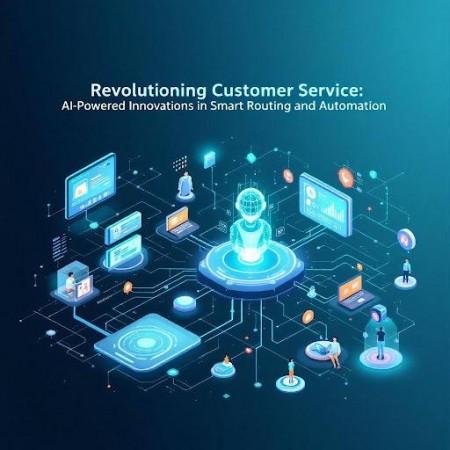
In this modern era, Customer service is undergoing a transformative shift, thanks to artificial intelligence (AI). A leading voice in this field, Nandini Suresh Kumar, explores the latest innovations in AI-driven smart routing and workflow automation, revealing how businesses can enhance efficiency, personalization, and overall service quality.
Intelligent Routing: Enhancing Efficiency in Customer Support
AI-powered smart routing systems are redefining customer interactions. These systems use advanced natural language processing (NLP) and sentiment analysis to assess customer intent and direct inquiries to the most suitable agent or automated service. Unlike traditional methods, smart routing dynamically adapts to real-time data, significantly reducing wait times and improving resolution rates. Research shows that AI-driven routing can improve intent recognition accuracy up to 85% and reduce handling times by 40%. Additionally, businesses utilizing these technologies experience a significant reduction in customer churn as AI ensures that inquiries are handled efficiently and with minimal frustration.
Low-Code Workflow Automation: Accelerating Service Delivery
The integration of low-code platforms in workflow management has enabled businesses to streamline operations without extensive coding expertise. These platforms allow for rapid process automation through visual workflow designers, rule engines, and integration layers. Organizations leveraging low-code systems have reported up to 75% reductions in development time while maintaining robust performance and reliability. This innovation democratizes automation, allowing even non-technical teams to optimize customer service processes efficiently. Furthermore, companies using low-code automation report enhanced agility, allowing them to quickly adapt to changing customer needs and operational demands.
Predictive Analytics: Anticipating Customer Needs
Advanced analytics and AI-powered insights platforms are playing a crucial role in customer service evolution. These platforms analyze vast amounts of customer interaction data, offering real-time predictions about customer behavior and service demand. With machine learning algorithms achieving up to 92% accuracy in customer behavior predictions, businesses can proactively address issues before they arise. Real-time dashboards and KPI monitoring further enhance decision-making efficiency, reducing operational disruptions. Predictive analytics also help companies improve personalization, offering tailored solutions to customers based on past interactions and behavioral patterns.
Security and Scalability: Ensuring Reliable AI Deployment
AI-enabled customer care solutions require stringent security and scalability measures to ensure data integrity and compliance. Modern security frameworks incorporate 256-bit encryption and multi-factor authentication to minimize security breaches. Scalability is another critical aspect, with AI-driven architectures handling up to 100,000 concurrent users while maintaining response times under 100 milliseconds. These advancements allow businesses to expand their AI capabilities without compromising service quality or security. Additionally, companies are increasingly adopting AI-driven compliance tools that help ensure adherence to data privacy regulations while improving transparency and trust between businesses and their customers.
The Road Ahead: Emerging Technologies in AI-Driven Customer Care
As AI continues to evolve, emerging technologies such as edge computing, blockchain, and enhanced NLP models are set to further revolutionize customer service. Edge computing reduces processing latency by up to 82%, while blockchain enhances data integrity and traceability. Additionally, improved NLP models are driving intent recognition accuracy beyond 97%, making AI-powered customer interactions more seamless and human-like. AI-powered self-service solutions, such as chatbots and virtual assistants, are also improving, with conversational AI now able to handle more complex inquiries while maintaining a natural and engaging user experience.
In conclusion, AI in customer service is not just about automation it's about creating smarter, more efficient, and customer-centric solutions. Nandini Suresh Kumar highlights how AI-driven smart routing, low-code automation, and predictive analytics are reshaping customer experiences while ensuring security and scalability. As these technologies continue to evolve, the future of customer service looks more adaptive and responsive. Companies that embrace AI innovations will gain a competitive edge, offering personalized, proactive, and efficient service experiences that drive customer loyalty and satisfaction.

















